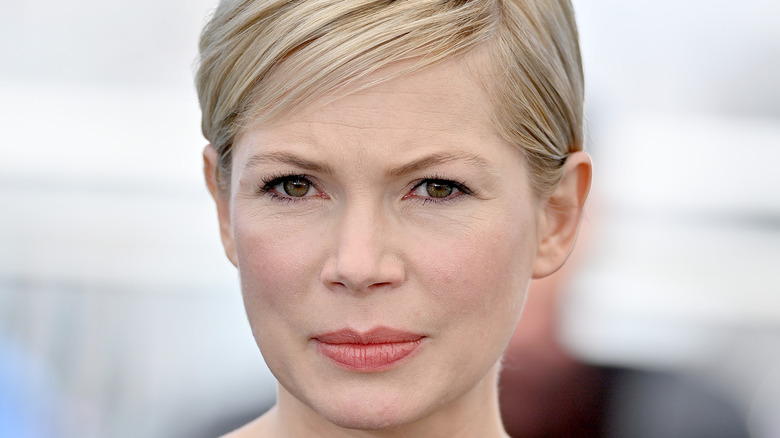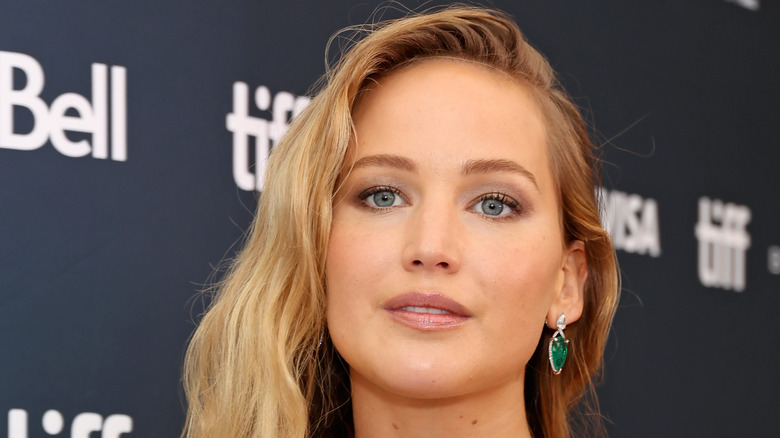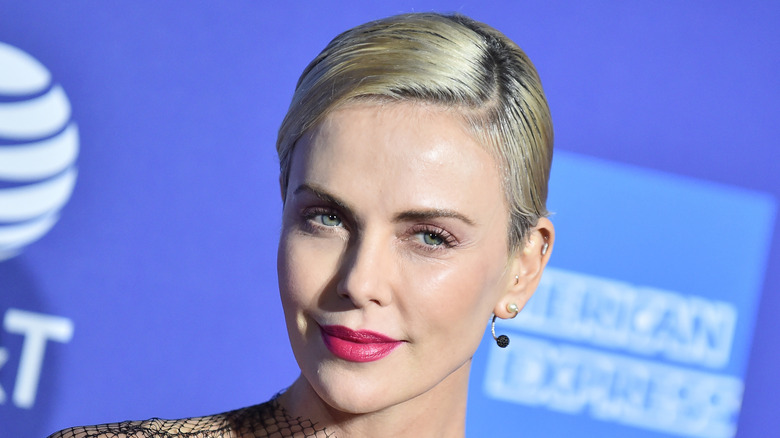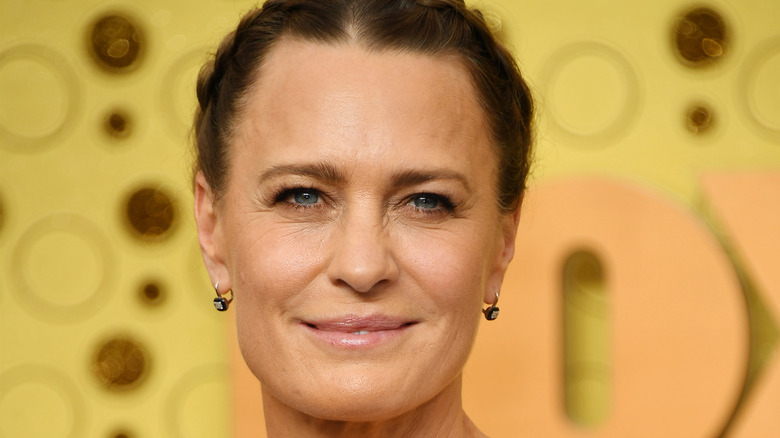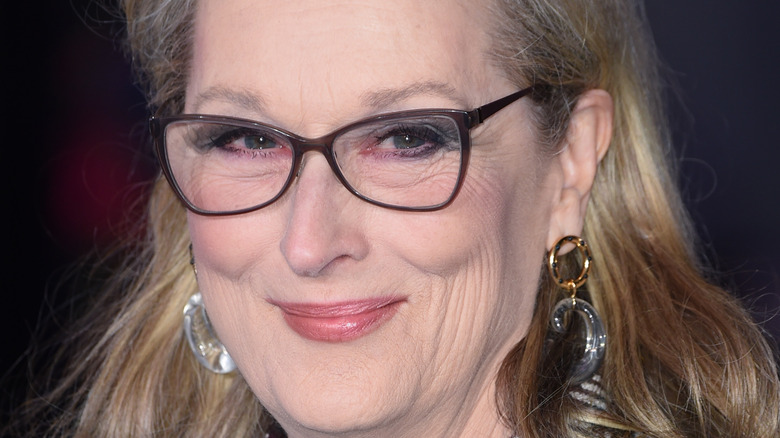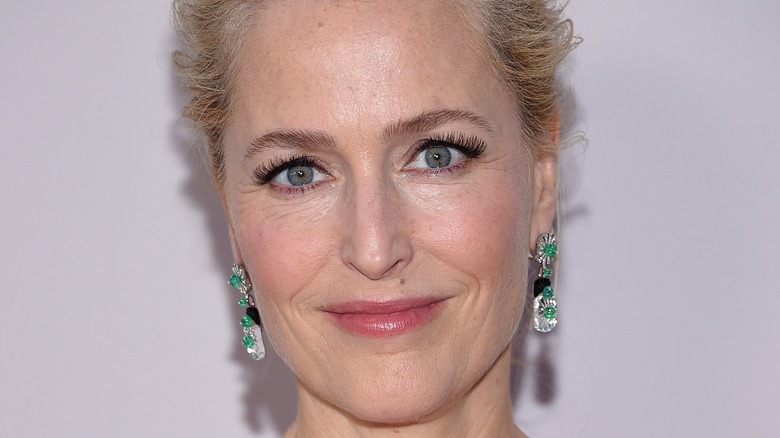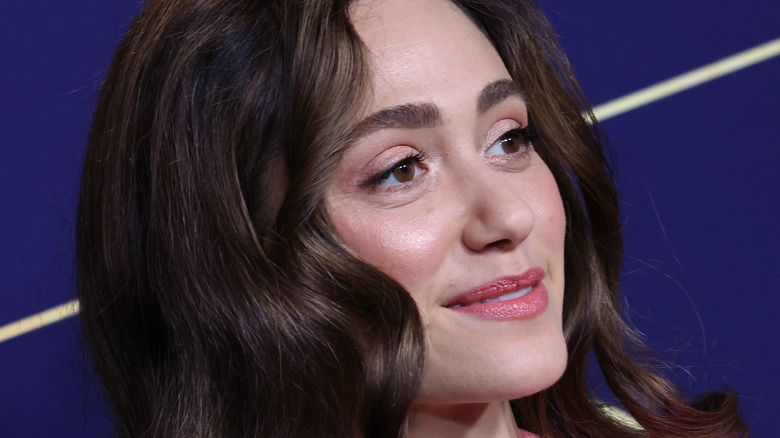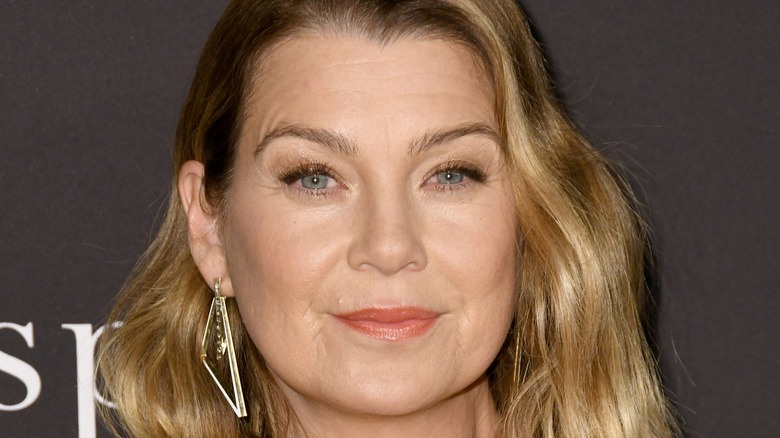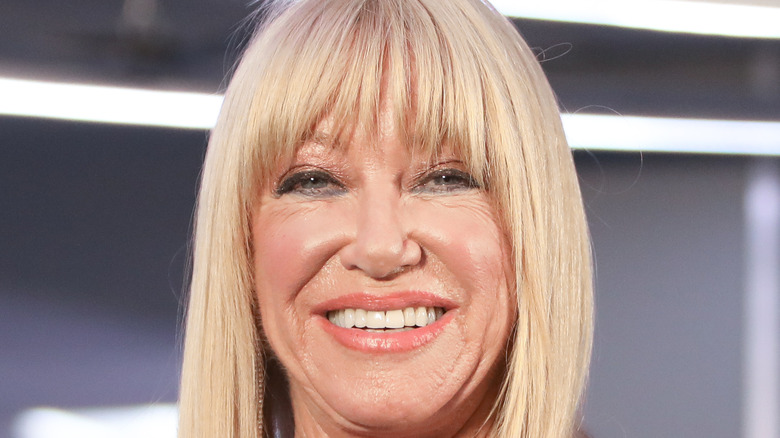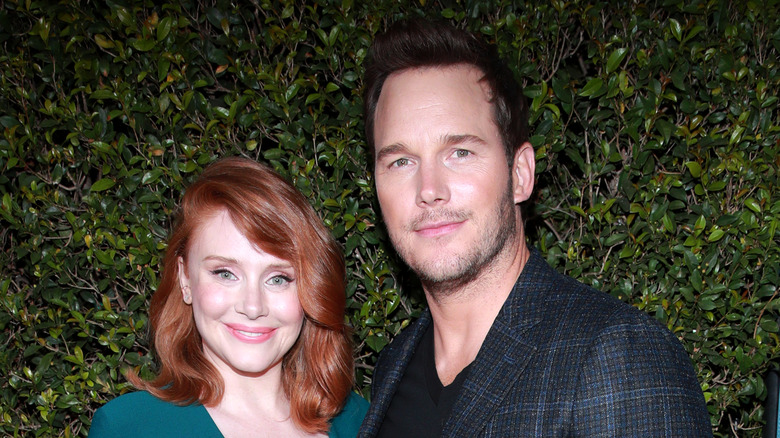11 Female Celebrities Who Have Negotiated For Better Pay
According to 2020 data from the Pew Research Center, a working woman in the United States earns just 84% of what a man makes. This gender pay gap has remained consistent for years, and impacts women in even more devastating figures when race, ethnicity, and religion is taken into consideration. The gap isn't limited to just one segment of society — rich and powerful women also experience the disparity. The Conversation reported that Hollywood's highest-earning female actors get paid a mere 38% of what their male counterparts earn, proving that no matter the spending power involved, female counterparts are earning significantly less money.
Michelle Williams was disgusted to learn that her co-star Mark Wahlberg received $1.5 million for "All the Money in the World" reshoots in 2017 while Williams herself was paid less than $1,000 (per The Guardian).
"This came as no surprise to me. It simply reinforced my life-learned belief that equality was not an inalienable right and that women would always be working just as hard for less money while shouldering more responsibility in their homes," Williams said at a hearing in Washington, D.C. about the gender pay gap. "And if it was like this for me, a white woman in a glamorized industry, how were my sisters suffering across their professions?"
Williams is just one of the powerful women in Hollywood to speak out about the gender pay gap in her industry. Here are some of the fierce females who have been pushing for better pay.
Jennifer Lawrence is still fighting to be paid as much as her male co-stars
Of the many unsavory details leaked in the Sony Pictures email hack of 2014, one rankled feminists in particular: Jennifer Lawrence and Amy Adams were paid substantially less than their male co-stars Bradley Cooper, Christian Bale, and Jeremy Renner for "American Hustle" in 2013 (per The Daily Beast). At the time, Lawrence was one of Hollywood's hottest stars, thanks to "The Hunger Games" franchise and her Academy Award winning performance in the 2012 dramedy, "Silver Linings Playbook."
After learning about the pay gap, Lawrence fought hard when negotiating her paycheck for "Passengers." The Hollywood Reporter noted that she held firm in demanding $20 million, even though co-star Chris Pratt had a larger role in the sci-fi romance. According to Parade, Pratt made $12 million for the 2016 film.
When Vanity Fair asked Lawrence about earning $25 million for "Don't Look Up" in 2021 while co-star Leonardo DiCaprio got $30 million, she was cautious in her response, pointing out that DiCaprio is a bigger name and that she felt content with her pay. Then Lawrence added, "It's extremely uncomfortable to inquire about equal pay. And if you do question something that appears unequal, you're told it's not gender disparity but they can't tell you what exactly it is."
The Oscar-winning actor was far blunter in a later interview with Vogue: "It doesn't matter how much I do. I'm still not going to get paid as much as that guy, because of my vagina?" she questioned.
Charlize Theron demanded fairer pay in 2016
The gender pay gap brought to light in the Sony Pictures email hack inspired Charlize Theron to negotiate harder for herself, Page Six reported. For the 2016 film "The Huntsman: Winter's War" (the prequel to "Snow White and the Huntsman"), Theron demanded the same paycheck as co-star Chris Hemsworth — an amount totaling more than $10 million.
"Charlize insisted that she get paid the same money as Chris. She has a great track record, so she got the same deal," one insider told Page Six. "One knock-on effect from the Sony hacking scandal is that there will be more sensitivity about equal pay for actresses and hiring practices at movie studios," said another insider.
While speaking at an event honoring Nelson Mandela's legacy, Theron discussed being a feminist and the challenge of stating what she wants without worrying about politeness, per The Hollywood Reporter. "I am in a position where I could put my foot down and say, 'I want equal pay to my male co-star,' who I had billed another movie with. We were doing a sequel, we had done it together, why not?" she stated. "I felt lucky," she said about receiving equal pay, then she corrected herself. "No, I didn't feel lucky. I deserved that and I asked for it."
Robin Wright asked for the same pay as her male co-star
When Robin Wright was interviewed for The Rockefeller Foundation's Insight Dialogues in 2016, she discussed how she had to ask for the same pay as Kevin Spacey, her "House of Cards" co-star. "You do have to shame and guilt them into it," she recalled.
Her demand was carefully timed — and Wright issued a threat worthy of her cunning on-screen character, Claire Underwood: "There are very few films or TV shows where the patriarch and the matriarch are equal, and they are in 'House of Cards.' I was looking at statistics, and Claire Underwood's character was more popular than his for a period of time in the season, so I capitalized on that moment. I was like, 'You better pay me, or I'm gonna go public.'"
But in 2017, Wright revealed to Rhapsody (via CNN) that the increase didn't materialize. "I don't think I'm getting paid the same amount," Wright said. "They told me I was getting a raise. But ... I don't think so." She added, "I really don't like being duped." The Golden Globe–winning actor voiced further thoughts. "It's such a male-dominant workforce still," she said. "There's a conditioning. And changing the condition of men is what needs to happen."
Eventually, Wright did (inadvertently) come out on top. After multiple people accused Spacey of sexual assault, his character was killed off abruptly and didn't appear on show's final season in 2018 (per The New York Times).
Meryl Streep negotiated a higher salary for herself
According to Carla Hacken, there was no backup plan if Meryl Streep had refused the role of Miranda Priestly in "The Devil Wears Prada." Hacken, executive vice president of Fox 2000 at the time, described to Variety how she cheered when she got the good news that Streep had signed on: "I was shouting in my office."
Streep was vital to the film getting made. Elizabeth Gabler, who was president of Fox 2000, told Entertainment Weekly that Hollywood people hesitated to get involved with the movie at first. They feared it would insult Anna Wintour, the legendary — and intimidating — Vogue editor who inspired Streep's character. "The fact is that Meryl Streep wanted to do the movie. That put that discussion at rest, because she was so admired and respected," Gabler said.
However, Streep received an unimpressive initial offer for the coveted role. "The offer was to my mind slightly, if not insulting, not perhaps reflective of my actual value to the project," the Oscar-winning actor told Variety. "There was my 'goodbye moment,' and then they doubled the offer. I was 55, and I had just learned, at a very late date, how to deal on my own behalf."
The Richest reported that Streep earned $5 million for the 2006 film. According to IMDb, the movie cost $35 million to make and brought in over $326 million worldwide.
Gillian Anderson had to fight for pay parity on 'The X-Files' — twice
The on-screen chemistry between Gillian Anderson and David Duchovny was evident right from the start of "The X-Files" in 1993, but the duo didn't receive equal treatment. In the show's earliest episodes, Anderson wasn't even allowed to stand beside Duchovny on-camera. "I can only imagine that at the beginning, they wanted me to be the sidekick," Anderson told The Daily Beast. She also took home a smaller paycheck than Duchovny. In the show's fourth season, she finally achieved pay parity.
When Anderson received an offer to star in the series' 2016 revival, she faced the Hollywood pay gap — again. "As usual, they come to me with half of what they want to offer David," she told The Hollywood Reporter.
For years, she'd told interviewers that the pay disparity she'd endured was in the past. "And then it happened again!" she exclaimed to The Daily Beast. She was surprised that few people seemed interested to learn she was again being offered less than Duchovny. "It was shocking to me, given all the work that I had done in the past to get us to be paid fairly."
"What people don't appreciate is that it's a business," series creator Chris Carter told Digital Spy in 2018. "They just don't automatically pay someone equal to someone else because that's what the world is asking for. I'm happy to say that Gillian is paid the same as David now."
To make up for past inequity, Emmy Rossum demanded higher pay than her male co-star
Sometimes pay parity isn't enough. Emmy Rossum — who has made a truly stunning transformation from an opera singer as a child to a well-respected actor, director, and producer as an adult — made headlines in 2016 when she demanded higher pay than her male co-star. Variety reported that William H. Macy had scooped up much larger paychecks than Rossum for the first seven seasons of the hit show "Shameless." To compensate for those years of inequity, Rossum requested a higher salary than Macy for the show's eighth season. Her salary negotiations stalled the show's renewal for a while.
"I'll tell you the person who supported me the most was William H. Macy. To have the man counterpart on my show be like, 'Yes, she does deserve this and more' was so validating," Rossum told The Hollywood Reporter. "And after it became public, it was a quick resolution."
Macy shared his feelings about his co-star's pay demands with TMZ. "She works as hard as I do," he said. "She deserves everything."
For many years, Ellen Pompeo earned less than her male co-star
"Grey's Anatomy" is television's longest-running medical drama — a feat it achieved in 2019 when it aired its 332nd episode and bested "ER," the previous record holder (per CNN). Considering that Ellen Pompeo has played the show's title character for every one of its 400 episodes (and counting), it's natural to assume she's always received the highest pay. In truth, co-star Patrick Dempsey took home the biggest paycheck at first.
"He was being paid almost double what I was in the beginning," Pompeo said in an interview with Variety. "I didn't even realize until we were renegotiating Season 3."
More than once, Pompeo approached Dempsey about negotiating as a team, but he always declined. "At one point, I asked for $5,000 more than him just on principle, because the show is 'Grey's Anatomy' and I'm Meredith Grey. They wouldn't give it to me," she told The Hollywood Reporter in 2018. Despite feeling tempted to quit, she ultimately refused "to let a guy drive me out of my own house."
After Dempsey left "Grey's Anatomy" in Season 11, the show remained popular. During its 14th season, Pompeo negotiated to become the highest-paid woman on TV, earning more than $20 million annually. She confessed to The Hollywood Reporter her initial worries about seeming greedy. "A guy wouldn't have any problem asking for $600,000 an episode. And as women, we're like, 'Oh, can I ask for that? Is that OK?'"
Suzanne Somers tried but failed to negotiate for equal pay
These triumphs make it all too easy to forget that earlier Hollywood women were often punished for demanding fairer compensation.
When "Three's Company" debuted in 1977, it focused on a trio of roommates played by Suzanne Somers, Joyce DeWitt, and John Ritter. Audiences loved Somers' character, Chrissy Snow. The blonde bombshell quickly became the show's breakout star, scooping up a People's Choice Award in 1978 for favorite female performer in a new TV program.
In 1980, as the popular sitcom was about to enter its fifth season, Somers requested that ABC increase her pay from $30,000 per episode to $150,000 — the same as what Ritter earned. "The show's response was, 'Who do you think you are?'" Somers told People. "They said, 'John Ritter is the star.'" Instead of receiving more money, Somers was fired from "Three's Company."
"I was fired as Chrissy Snow for asking to be paid what the men were being paid," she told Chatelaine. However, she said her character's "packaging" — blonde, pretty, clumsy, ditzy — meant that Somers herself was never viewed as a feminist.
"Life isn't fair," she told The Hollywood Reporter more than three decades after the incident. "Getting fired for asking for a raise wasn't fair, but I landed on my feet and I've done OK."
Sometimes a male co-star is the one who makes pay equity happen
Even today, the unpleasant truth is that Hollywood's most powerful women sometimes achieve pay parity only when their male co-stars give up some of their own pay.
For the movie "21 Bridges," Chadwick Boseman sacrificed part of his paycheck to ensure Sienna Miller received fair compensation. "Chadwick ended up donating some of his salary to get me to the number that I had asked for," Miller told Empire. "He said [that] was what I deserved to be paid."
Emma Stone has experienced a similar situation more than once. "In my career so far, I've needed my male co-stars to take a pay cut so that I may have parity with them. And that's something they do for me because they feel it's what's right and fair," she said in an interview with Out. "If my male co-star, who has a higher quote than me but believes we are equal, takes a pay cut so that I can match him, that changes my quote in the future and changes my life."
Bryce Dallas Howard's male co-star negotiated on her behalf
Chris Pratt certainly changed Bryce Dallas Howard's life when he started negotiating for her. Howard had been paid far less than her co-star for acting in the "Jurassic World" trilogy. Initial reports indicated that Pratt earned $10 million for "Jurassic World: Fallen Kingdom" while Howard took home $8 million, but she told Insider that the pay gap was actually much greater than $2 million.
"When I started negotiating for 'Jurassic,' it was 2014, and it was a different world, and I was at a great disadvantage," Howard said. "And, unfortunately, you have to sign up for three movies, and so your deals are set."
After she talked to Pratt about the pay disparity, he offered to negotiate other franchise opportunities for both of them, such as video games and amusement park rides. Howard recalled that he reassured her, "I'm gonna do all the negotiating. We're gonna be paid the same, and you don't have to think about this, Bryce."
She expressed her gratitude to Pratt: "And I love him so much for doing that. I really do, because I've been paid more for those kinds of things than I ever was for the movie."
